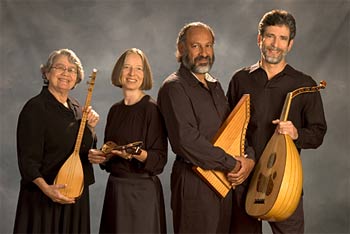
LECTURES
FOR DEPARTMENTS OF MUSIC, ETHNOMUSICOLOGY,
FOLKLORE AND ETHNOLOGY

I. The Pleasures And Challenges of Oral Traditions
A representation of the process of research,
arrangement and presentation of the unique Sephardic repertoire which
has been preserved by oral transmission. Examples of original sources
are presented, as are aspects of the development of musical arrangement.
We discuss:
a. the broad range of musical influences which affected this repertoire
b. the uses of instruments from the Near and Middle East, as well as
those from Medieval and Renaissance Europe
c. our unique process of composing arrangements
II.
Critical Listening Class
A lecture using musical examples to demonstrate the following concepts:
1. Differences between western and eastern music
2. Echoes of flamenco music in Judeo-Spanish musical traditions
3. Spanish folk song preserved by the Spanish Jews
4. Turkish folk song preserved and adapted by the Spanish Jews
5. Bulgarian folk dance reflected in Judeo-Spanish repertoire
6. Primitive chant reflected in Judeo-Spanish repertoire
7. The medieval Spanish ballad preserved in exile for 500 years
8. Modern compositions which evolved from all of the above.
FOR DEPARTMENTS OF SPANISH, HISTORY, LITERATURE
I. Pre-Expulsion
Spain - an Aural Perspective
A unique
approach to Spain prior to 1492 through the ears and eyes of the Spanish
Jews, the Sephardim, who preserved their Spanish heritage and language,
Judeo-Spanish (often called Ladino) for five centuries, in exile. Through
analysis of the romansero a body of ballads preserved by oral
tradition, this performance/lecture offers insights into Spanish language,
history, geography, folklore, linguistics and poetics.
II. Spanish
civilization class
We perform
and discuss a variety of old ballads whose texts reflect pictures of
medieval Spain, including historical perspectives of the Moorish world.
We also include some recent compositions which reflect the continuing
attachment of the Spanish Jews to their historical homeland.
JUDAIC STUDIES DEPARTMENT
It Was
Always a Time of Singing: An Introduction to Sephardic Culture
through Para-liturgical and Ballad Repertoire.
Concert
focuses on a significant part of Sephardic musical repertoire that includes
para-liturgical holiday celebration customs, as well as ballades which
tell Bible stories. This repertoire is a fascinating reflection of the
diverse cultural influences on the Sephardic diaspora--the "paths
of exile"--as well as unique central motifs of the Sephardim from
the time of the Spanish Inquisition to the present.
WOMEN'S STUDIES DEPARTMENT
Kitchen
Archivists: The Role of Sephardic Women in the Preservation of the
Judeo-Spanish Musical Repertoire.
A performance/lecture
which reveals the processes by which the Sephardic women were "curators" of
an intangible library of folk and para-liturgical traditions for more
than 500 years in exile. The lecture explores music and folktales that
have been the particular domain of women, analyzing each from historical,
sociological, personal and literary perspectives.
Please note: Unless the venue is local (Boston Area), these lectures are offered in conjunction with a concert appearance
Suggested lecture time: 45 minutes—1 hour; or class session